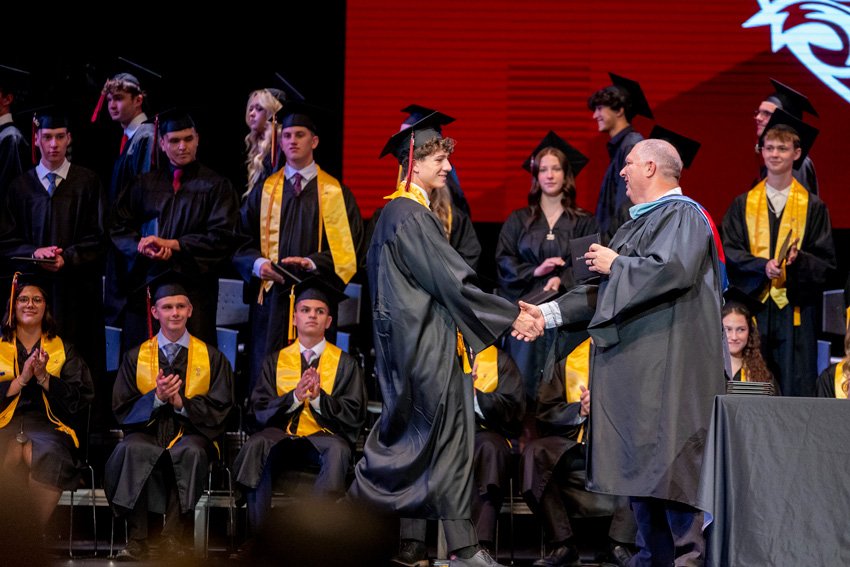In high schools across the country, students can be seen trudging down hallways towing loads of future knowledge on their backs. This knowledge, in the form of textbooks, three ring binders and novels, is transported around campuses in backpacks.
The number and size of textbooks weigh on the backs of students. As backpacks become heavier, students may develop increased head, shoulder, neck and back pain. This may also aggravate scoliosis [excessive, sideways curvature of the spine].
“If a student has scoliosis, an overweight backpack may strain the spine more,” Dr. Timothy Meyers, DC [Doctor of Chiropractic], said. “Young people in adolescence with bad posture who carry heavy backpacks may aggravate scoliosis.
“”Muscles can get overworked and cause a strain, which is a muscle tear, in the shoulder and back. If a backpack hangs too low on a student, it can cause even more strain.”
Heavy backpacks can overwork muscles and cause strain in the shoulders and back and they also can create other back-related injuries.
“Not only do overweight backpacks strain shoulder and back muscles but they pull on the collar, bone which then pinches the nerves between the collar and first rib,” Meyers added. “This can cause numbness and tingling in the hands. If a student is experiencing sharp, excessive pain, some worried parents may take them to the emergency room.”
Back pain among students is not only caused by overfilling backpacks but also by wearing them slung over one shoulder rather than properly on both shoulders. Most doctors agree that backpacks should be no heavier than 10%- 15% of a student’s body weight.
Lockers provide students with a place to store extra textbooks and binders between classes, eliminating the need for backpacks being filled to excess.
“I use my locker to dump my books after each class,” Alysa Muzny, ’05, said. “That way I do not have to worry about losing my books or carrying them around campus. After one class is over, I go to my locker and replace the previous period’s books for the next one’s.”
Backpacks are not only used for hauling academic items around campus. Some students also utilize them as storage space for entertainment equipment and other items.
“I like to keep my portable CD player and headset in my backpack along with a couple of CDs,” Daniel Crosby, ’06, said. “From time to time I also have my PDA in my backpack but normally I just have my school books. Basically, my backpack is my locker; I’m afraid of tardies so I carry all my books with me all day.”
Crosby is not the only student lugging extra pounds around campus. Muzny also struggles with her heavy load.
“Sometimes I carry a book that I am currently reading outside of school in my backpack,” Muzny said. “But normally I carry things like my school books, binders, band music, vocabulary book, calculator, pencils and pens. I often lose and find different things in my backpack.”
Some students prefer to leave backpacks in their lockers while others tote them throughout the day.
“When I’m at school my backpack is always with me,” Sarah McComb, ’04, said. “I’ve had people refer to it as my tortoise shell because it’s always on my back. One week I carried a satchel to school and everyone asked me, ?Sarah, where is your tortoise shell today?'”
In response to complaints about heavy backpacks, many schools try to provide two textbooks per student for each subject to lessen the weight of backpacks.
In schools that provide double sets of textbooks, students are instructed to keep one book at home for homework reference and the second at school for classroom use. However, not all schools are able to provide that luxury.
“If our school provided double sets of textbooks, we would have to charge $400 more in tuition per student,” John Endicott, vice principal, said. “Since we are a private school, we can’t afford to spend so much money on extra textbooks. Although, in some cases, parents have approached us and requested a second textbook for their student because of certain health issues.”
Some students need this arrangement as per doctor’s orders.
“Kids who already have back problems need to keep extra sets of textbooks at home and at school.” Meyers said. “This reduces the load students carry around their schools.”
For more information on the spinal dangers caused by backpacks and tips to prevent such pains, go to www.chiro.org/LINKS/backpacks.shtml or go to www.Fresno.networkofcare.org/kids and click on News Archive.
To contact Dr. Meyers, call his office at (559) 227-5066.






